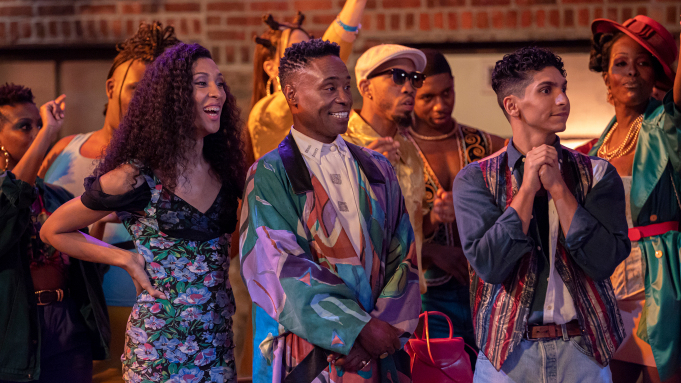In its brief, brash life, “Pose” (shown here) has done important things.
It introduced viewers to a world most of us hadn’t heard of – the flash and flair of ballroom competitions in 1990s New York. It also re-introduced us to something we wanted to forget – the peak of the AIDS crisis.
Now it’s ending, sort of abruptly. The third and final season — ending Sunday (June 6) is only seven episodes long; we’d grumble about that, except:
– Many of these have been supersized episodes; the finale (10 p.m. onFX) is movie-length; it promptly reruns at 12:05 a.m.
–And enough has happened here to fill up longer and fatter series.
We met some of these young people at their nadir. Many are gay, some are transexual, most feel like outsiders. Good souls invite them into “houses,” where they live together and compete in the ballrooms.
We also met the king of the ballroom, a strident emcee name Pray Tell, zestfully played by Tony-winner Billy Porter.
This was a role– and a show– done with flash, flair and extraordinary skill. Porter won an Emmy the first season and a nomination the second. He also drew two nominations from the Golden Globes and the Television Critics Association.
The show drew nine more Emmy nods, including best drama. That one was the first season, when the TCA nominated it for best drama … and when it won a prestigious Peabody Award.
This was a show that stirred excitement quickly, then almost disappeared when the pandemic arrived. The second season ended Aug. 20, 2019; the third began on May 2, 2021 – 20 months later – and was confined to these final seven episodes.
Maybe that was just as well: Like many shows these days, “Pose” accelerated its plot quickly. It quickly reached a logical time to quit … especially as its characters confronted AIDS.
And during this last season, we couldn’t help notice that the show sometimes resorted to speechmaking. Barely disguised as dialogue, characters would occasionally proclaim things that – while wise and worthy – didn’t really resemble human conversation.
This might be the time for “Pose” to wrap up – especially after doing its job so quickly and so well. It introduced us to the ballrooms … re-introduced use to the worst moments of the AIDS crisis … and made us care deeply about some richly drawn characters.
It also shows us, via AIDS, what happens when a problem is faced sluggishly, because its victims lack power. “Pose” has been a powerful force. Now — after a final, two-hour burst of paint, triumph and flashy moves — it will end.
